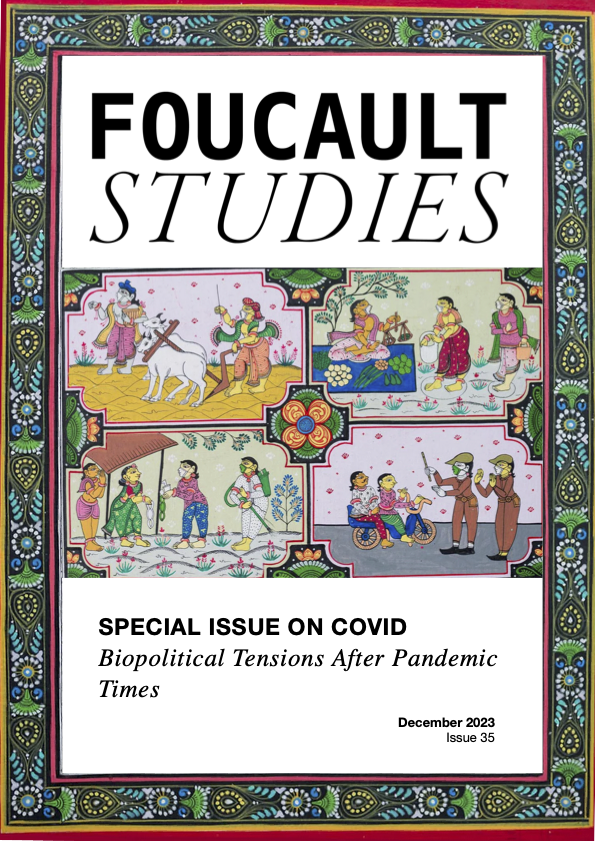Securing the Pandemic: Biopolitics, Capital, and COVID-19
DOI:
https://doi.org/10.22439/fs.i35.7072Schlagworte:
Biopolitics, Capitalism, COVID-19, Foucault, Marxism, SecurityAbstract
In this article, I consider the interoperation of twin contemporary governmental imperatives, fostering economic growth and ensuring biopolitical security, in the face of the COVID-19 pandemic. At a theoretical level, I thereby consider the question of the applicability of a Marxist analysis vis-à-vis a Foucauldian one in understanding state responses to the pandemic. Despite the apparent prioritization of preserving life over economic activity by governments around the world in this context, I will argue that the basic problem that COVID-19 posed for the state was one of sheer unknowability and that the fundamental motive for the governmental response was a concern for security in Foucault’s sense, that is, ensuring a baseline predictability in the social field, upon which economic activity, like myriad other social activity, is premised. I argue that this drive for security motivated states to appeal to medical experts to determine the direction of their response, who in turn applied a default model of quarantine. While we cannot be certain that the medically-guided response was optimal in terms either of health outcomes or economically, I argue it served its essential purpose by providing a structured framework for social action in the face of the unknown. While this is vital for the maintenance of the basic coordinates of capitalist society, I argue it nonetheless cannot entirely be explained simply by an appeal to Marxist categories and instead requires Foucault’s insights into the medicalization of society.
Literaturhinweise
Abraham, John, “The Pharmaceutical Industry as a Political Player,” The Lancet 360:9344 (2002), 1498–1502. https://doi.org/10.1016/s0140-6736(02)11477-2
Abraham, John, “Pharmaceuticalization of Society in Context: Theoretical, Empirical and Health Dimensions,” Sociology 44:4 (2010), 603–622. https://doi.org/10.1177/0038038510369368
Agamben, Giorgio, “L’invenzione di un’epidemia,” Quodlibet. https://www.quodlibet.it/giorgio-agamben-l-invenzione-di-un-epidemia (accessed June 29, 2023).
Althusser, Louis, “Contradiction and Overdetermination,” in For Marx [1965]. London: Verso, 2005.
Althusser, Louis, On the Reproduction of Capitalism: Ideology and Ideological State Apparatuses [1995]. London: Verso, 2014.
Althusser, Louis and Étienne Balibar, Reading Capital [1968]. London: New Left Books, 1970.
Armstrong, David, “The rise of surveillance medicine,” Sociology of Health & Illness 17:3 (1995), 393-404. https://doi.org/10.1111/1467-9566.ep10933329
Armstrong, David, ‘The COVID-19 pandemic and cause of death’, Sociology of health & illness 43:7 (2021), 1614-1626. https://doi.org/10.1111/1467-9566.13347
CDC, “National Pandemic Influenza Plans,” Centers for Disease Control and Prevention. https://www.cdc.gov/flu/pandemic-resources/planning-preparedness/national-strategy-planning.html (accessed June 29, 2023).
Department of Health & Social Care, “UK pandemic preparedness,” GOV.UK. https://www.gov.uk/government/publications/uk-pandemic-preparedness/uk-pandemic-preparedness#uk-pandemic-preparedness-plans (accessed June 29, 2023).
Engels, Friedrich, The Condition of the Working Class in England. Stanford: Stanford Universi-ty Press, 1958.
Foucault, Michel, Abnormal [1999]. London: Verso, 2003.
Foucault, Michel, History of Sexuality 1 [1976]. New York: Pantheon, 1978.
Foucault, Michel, “The Birth of Social Medicine,” in Power: Essential Works of Michel Foucault Vol. III. London: Penguin, 2002.
Foucault, Michel, The Order of Things [1966]. London: Routledge, 1989.
Foucault, Michel, Society Must Be Defended. Trans. David Macey. London: Penguin, 2003.
Foucault, Michel, The Birth of Biopolitics [2004]. Basingstoke: Palgrave Macmillan, 2008.
Foucault, Michel, “The Crisis of Medicine or the Crisis of Antimedicine?,” Foucault Studies 1 (2004), 5-19. https://doi.org/10.22439/fs.v0i1.562
Foucault, Michel. Security, Territory, Population [2004]. Basingstoke: Palgrave Macmillan, 2007.
Gros, Frédéric, The Security Principle. London: Verso, 2019.
Freud, Sigmund, The Interpretation of Dreams. Oxford: OUP, 1999.
Jonung, Lars, “Sweden's Constitution Decides Its COVID-19 Exceptionalism,” Working Paper 2020:11, Department of Economics, School of Economics and Management, Lund University (2020). http://dx.doi.org/10.2139/ssrn.3796848
Kelly, Mark, “What’s in a Norm? Foucault’s Conceptualisation and Genealogy of the Norm,” Foucault Studies 27 (2019), 1–22. https://doi.org/10.22439/fs.v27i27.5889
Kelly, Mark G. E., Foucault and Politics: A Critical Introduction. Edinburgh: Edinburgh Uni-versity Press, 2014.
Kelly, M. G. E., Biopolitical Imperialism. Alresford: Zero Books, 2015.
Kuhn, Thomas, The Structure of Scientific Revolutions. University of Chicago Press: Chicago, 1970.
Lacina, Linda, “Nearly 3 billion people around the globe under COVID-19 lockdowns,” World Economic Forum. https://www.weforum.org/agenda/2020/03/todays-coronavirus-updates/ (accessed June 29, 2023).
Larkin, Howard D., “COVID-19 Health Policies and Economies in Nordic Countries,” JA-MA 328:11, 1029 (2002). https://doi.org/10.1001/jama.295.2.180
Lemke, Thomas, Biopolitics: An Advanced Introduction. New York: New York University Press, 2011.
Lenin, V. I., The State and Revolution [1918]. London: Penguin, 1992.
Marx, Karl, Capital: A Critique of Political Economy 1. Harmondsworth: Penguin, 1976.
Moon, M. Jae, Kohei Suzuki, Tae In Park and Kentaro Sakuwa, ‘A comparative study of COVID-19 responses in South Korea and Japan: political nexus triad and policy re-sponses’, International Review of Administrative Sciences 87:3, 651–671 (2021). https://doi.org/10.1177/0020852321997552
Pew Research Center, “Views of how officials, public have responded to COVID-19,” Pew Research Center. https://www.pewresearch.org/politics/2020/03/26/views-of-how-officials-public-have-responded-to-covid-19/ (accessed June 29, 2023).
Pietrabissa, Giada, and Susan G. Simpson, “Psychological Consequences of Social Isolation During COVID-19 Outbreak,” Frontiers in Psychology 11 (2020). https://doi.org/10.3389/fpsyg.2020.02201
Shang Weijing, Yaping Wang, Jie Yuan, Zirui Guo, Jue Liu and Min Liu, “Global Excess Mortality during COVID-19 Pandemic: A Systematic Review and Meta-Analysis,” Vaccines 10:10 (2022). https://doi.org/10.3390/vaccines10101702
Shir-Raz, Yaffa, Ety Elisha, Brian Martin, Natti Ronel and Josh Guetzkow, “Censorship and Suppression of Covid-19 Heterodoxy: Tactics and Counter-Tactics,” Minerva (2022). https://doi.org/10.1007/s11024-022-09479-4
Vertinsky, Liza, “Pharmaceutical (Re) Capture,” Yale Journal of Health Policy, Law and Eth-ics 20 (2021): 146.
Wise, Jacqui, “Covid-19: Leaked messages reveal casual policy making—and love for Whitty,” BMJ 380 (2023), 522 https://doi.org/10.1136/bmj.p522
World Health Organization, Pandemic Influenza Preparedness and Response. Geneva: World Health Organization, 2009.
World Health Organization, “WHO Coronavirus (COVID-19) Dashboard,” World Health Organization. https://covid19.who.int/?mapFilter=deaths (accessed March 23, 2023).
Downloads
Veröffentlicht
Zitationsvorschlag
Ausgabe
Rubrik
Lizenz

Dieses Werk steht unter der Lizenz Creative Commons Namensnennung - Nicht-kommerziell - Keine Bearbeitungen 4.0 International.
Authors retain copyright to their work, but assign the right of the first publication to Foucault Studies. The work is subject to a CC BY-NC-ND 4.0 license, but despite these restrictions, authors can take for granted that Foucault Studies will permit articles published in Foucault Studies to be translated or reprinted in another format such as a book providing a full reference is made to Foucault Studies as the original place of publication.



